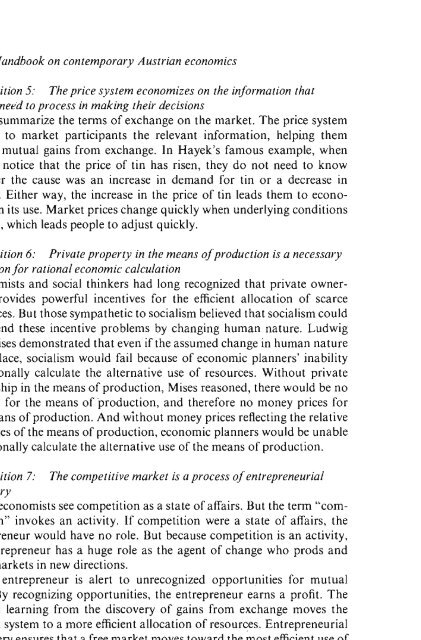Handbook on Contemporary Austrian Economics
Handbook on Contemporary Austrian Economics
Handbook on Contemporary Austrian Economics
You also want an ePaper? Increase the reach of your titles
YUMPU automatically turns print PDFs into web optimized ePapers that Google loves.
XIV<br />
<str<strong>on</strong>g>Handbook</str<strong>on</strong>g> <strong>on</strong> c<strong>on</strong>temporary <strong>Austrian</strong> ec<strong>on</strong>omics<br />
Propositi<strong>on</strong> 5: The price system ec<strong>on</strong>omizes <strong>on</strong> the informati<strong>on</strong> that<br />
people need to process in making their decisi<strong>on</strong>s<br />
Prices summarize the terms of exchange <strong>on</strong> the market. The price system<br />
signals to market participants the relevant informati<strong>on</strong>, helping them<br />
realize mutual gains from exchange. In Hayek's famous example, when<br />
people notice that the price of tin has risen, they do not need to know<br />
whether the cause was an increase in demand for tin or a decrease in<br />
supply. Either way, the increase in the price of tin leads them to ec<strong>on</strong>omize<br />
<strong>on</strong> its use. Market prices change quickly when underlying c<strong>on</strong>diti<strong>on</strong>s<br />
change, which leads people to adjust quickly.<br />
Propositi<strong>on</strong> 6: Private property in the means of producti<strong>on</strong> is a necessary<br />
c<strong>on</strong>diti<strong>on</strong> for rati<strong>on</strong>al ec<strong>on</strong>omic calculati<strong>on</strong><br />
Ec<strong>on</strong>omists and social thinkers had l<strong>on</strong>g recognized that private ownership<br />
provides powerful incentives for the efficient allocati<strong>on</strong> of scarce<br />
resources. But those sympathetic to socialism believed that socialism could<br />
transcend these incentive problems by changing human nature. Ludwig<br />
v<strong>on</strong> Mises dem<strong>on</strong>strated that even if the assumed change in human nature<br />
took place, socialism would fail because of ec<strong>on</strong>omic planners' inability<br />
to rati<strong>on</strong>ally calculate the alternative use of resources. Without private<br />
ownership in the means of producti<strong>on</strong>, Mises reas<strong>on</strong>ed, there would be no<br />
market for the means of producti<strong>on</strong>, and therefore no m<strong>on</strong>ey prices for<br />
the means of producti<strong>on</strong>. And without m<strong>on</strong>ey prices reflecting the relative<br />
scarcities of the means of producti<strong>on</strong>, ec<strong>on</strong>omic planners would be unable<br />
to rati<strong>on</strong>ally calculate the alternative use of the means of producti<strong>on</strong>.<br />
Propositi<strong>on</strong> 7: The competitive market is a process of entrepreneurial<br />
discovery<br />
Many ec<strong>on</strong>omists see competiti<strong>on</strong> as a state of affairs. But the term "competiti<strong>on</strong>"<br />
invokes an activity. If competiti<strong>on</strong> were a state of affairs, the<br />
entrepreneur would have no role. But because competiti<strong>on</strong> is an activity,<br />
the entrepreneur has a huge role as the agent of change who prods and<br />
pulls markets in new directi<strong>on</strong>s.<br />
The entrepreneur is alert to unrecognized opportunities for mutual<br />
gain. By recognizing opportunities, the entrepreneur earns a profit. The<br />
mutual learning from the discovery of gains from exchange moves the<br />
market system to a more efficient allocati<strong>on</strong> of resources. Entrepreneurial<br />
discovery ensures that a free market moves toward the most efficient use of<br />
resources. In additi<strong>on</strong>, the lure of profit c<strong>on</strong>tinually prods entrepreneurs to<br />
seek innovati<strong>on</strong>s that increase productive capacity. For the entrepreneur<br />
who recognizes the opportunity, today's imperfecti<strong>on</strong>s represent tomorrow's<br />
profit. I The price system and the market ec<strong>on</strong>omy are learning

















